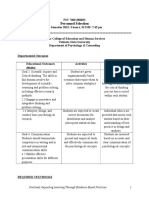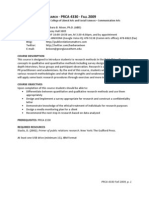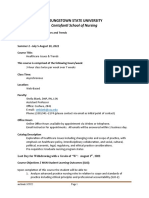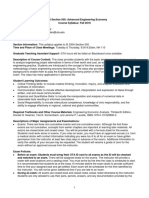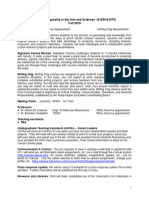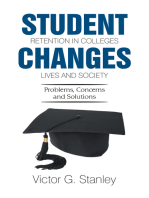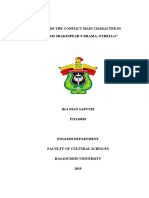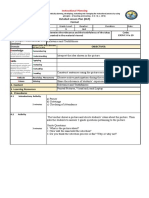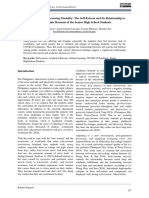Syllabus Pa Sp20
Syllabus Pa Sp20
Uploaded by
MarcelaCopyright:
Available Formats
Syllabus Pa Sp20
Syllabus Pa Sp20
Uploaded by
MarcelaCopyright
Available Formats
Share this document
Did you find this document useful?
Is this content inappropriate?
Copyright:
Available Formats
Syllabus Pa Sp20
Syllabus Pa Sp20
Uploaded by
MarcelaCopyright:
Available Formats
COURSE OUTLINE
CLP 2001 U01 –Personal Adjustment -Spring 2020
FIU Modesto A. Maidique Campus
INSTRUCTOR: William Berry, L.M.H.C., C.A.P.
DEPARTMENT: Psychology
EMAIL CONTACT: wberry@fiu.edu
PHONE CONTACT: 754 366-0720
MEETING TIME: Mon, Wed, Fri 9:00 to 9:50am
ROOM: SIPA 100
OFFICE HOURS: Arrangements made by appointment
I. COURSE CATALOG DESCRIPTION:
This course will cover some basic information about the facilitation of personal
adjustment in the social and occupational life of the individual. Emphasis is on
interpersonal aspects of effective behavior.
COURSE AND LEARNING OBJECTIVES:
Students will be able to
Identify major components of personal growth.
Relate aspects of personal growth to the student’s own psychological growth.
Explain the importance of mindfulness to happiness.
Define aspects of effective interpersonal communication.
Describe aspects of self-actualization.
Explain how to better cope with and manage emotions.
Relate aspects of personal and psychological growth to happiness.
REQUIRED TEXT:
Goud, Nelson H. (2009)
Psychology and Personal Growth, (8th ed)
Pearson Publishers
ISBN 13: 978-0-205-62675-5
II: COURSE REQUIREMENTS AND POLICIES
Courtesy: Cell phones or similar devices other than computers should be placed
in silent mode or turned off. Text messaging during class is not allowed. Such
activity is insensitive, rude and disruptive. Your cooperation is requested and
greatly appreciated.
Participation: Opportunity will be provided to discuss concepts and to share
ideas as well as to earn points toward your final grade. Your active participation,
courtesy, and respect for the perspectives, ideas and opinions of others will make
time spent in class more productive and stimulating. “Participation” means
activities other than just sitting and listening. A reminder: participation and
attendance make up 40% of your course grade.
Late to Class Policy: Students are expected to attend classes on time. It is
understood that occasionally one may encounter traffic or have some personal
issues which delay arrival. Students who are habitually late (three or more late
arrivals) will have each three late arrivals counted as an absence. Students who
arrive in class more than twenty (20) minutes late without an acceptable excuse
will be admitted to class but will be marked absent.
Absence: Attendance is essential to gaining an understanding of the material, and
as this is a discussion class, to the overall functioning of the course. Absence will
result in a deduction from the class participation grade. Role is taken
spontaneously throughout the semester. If a student’s number is called and the
student is not present, a loss of 3-points results, and it cannot be earned back.
Students are responsible for any material missed in the class.
III: ASSIGNMENTS, EVALUATION PROCEDURES, AND GRADING POLICY:
Students will be graded on their performance in the following:
CLASS PARTICIPATION- Students are expected to actively participate in the
discussion of course related issues. Student participation should reflect knowledge
of assigned readings. This comprises 40% of your overall grade.
CLASS ATTENDANCE IS MANDATORY
Attendance is essential to gaining an understanding of the material. Students are
responsible for any material missed in the class. As this is a short class and
attendance will not be taken every class, it will be taken randomly during the
semester. If you are absent the time it is taken, you will lose 2% of the overall
grade for each recorded absence. Additionally, if your name is called for
discussion in class, and you are not there to respond, 2 points will be deducted
from the possible participation points.
THREE QUIZZES- There is a total of three quizzes, approximately for each
third of the semester. Online quizzes will be given on the scheduled dates.
Material covered will include assigned readings, lecture material, and/or materials
presented in video format. These quizzes are considered open notes, but there
will be a time-limit so one should know the material well enough to access it.
Make-up quizzes, except for a reason other than illness or an emergency, are not
allowed. Should illness or emergency prevent you from taking the quiz, please
email the instructor. Documentation of the illness or emergency will be required,
and the make-up quiz would be administered ASAP. A documented absence for
the quiz still results in a loss of 5% (as the make-up allows more time to study
than peers have). The grades for the three quizzes will be averaged and will
account for 20% of your overall grade.
FINAL EXAM- There will be a cumulative final exam at the end of the semester
(during finals week). The exam will be proctored, and the student is responsible to
purchase the proctoring application (it will be less than $15 and is purchased
when one is about to take the final). The exam, like the quizzes, will be taken on
one’s home computer. However, unlike the quizzes, the final exam is not open
note / text and you will be monitored by the app for cheating. Google Chrome
should be used with this system. You can learn more about the proctoring
program here: https://honorlock.com/students/
The grade of the final will be worth 20% of your overall grade.
ONLINE PAPER: Students will be required to submit a short paper online
through Canvas. These papers will be related to topics discussed in class. Topics
will be announced, and students should expect to complete one of three short
papers of approximately two pages each. The grade will account for 20% of
your overall grade.
EXTRA CREDIT: Students can obtain up to 5 extra credit points by participating in
SONA System experiments at the university. Students would need to list this class with
me as the professor to obtain said credits. The credits are reported to the professor at the
end of the semester. The deadline for credit would be April 15 th.
GRADING POINTS:
o Class Participation and Attendance 40
o Online Paper 20
o Three Quizzes 20
o Final Exam 20
100 points
GRADING- The university’s grading policy is as follows:
93-100 A
90-92 A- 77-79 C+
87-89 B+ 70-76 C
83-86 B 60-69 D
80-82 B- below 60 F
IV. ACADEMIC INTEGRITY:
Florida International University is a community dedicated to generating and
imparting knowledge through excellent teaching and research, the rigorous and respectful
exchange of ideas, and community service. All students should respect the right of others
to have an equitable opportunity to learn and to honestly demonstrate the quality of their
learning. Therefore, all students are expected to adhere to a standard of academic
conduct, which demonstrates respect for themselves, their fellow students, and the
educational mission of the University. All students are deemed by the University to
understand that if they are found responsible for academic misconduct, they will be
subject to the Academic Misconduct procedures and sanctions, as outlined in the Student
Handbook.
Students should be aware of the University Policies on academic honesty, as these
standards will be strictly enforced. According to the student handbook, cheating is
defined as “unauthorized use of books, notes, aids, or assistance from another person with
respect to examinations, course assignments…examination papers or course material,
whether originally authorized or not” (p. 103-104). If a student is found cheating they
will be subject to discipline by the University authorities.
V. SCHOLARLY CONDUCT:
Students are expected to participate in and contribute to an environment that is
conducive to learning. As such, students’ behavior in class should be of a nature that
fosters learning and discussion. Behaviors that are disruptive to this process will not be
tolerated. Arriving to class late or leaving early can be disruptive, and is discouraged.
Failure to create an environment conducive to learning will, at the minimum, affect the
student’s class participation grade, and possibly result in removal from the course.
VI. OTHER CLASS POLICIES:
The university is committed to the principle that there shall be no differences in the
treatment of persons because of race, creed, national origin, age, sex, or disability, and
that equal opportunity and access to all facilities shall be available to all. If you require
special accommodations in order to participate, please contact the instructor. Other class
policies may be announced as needed in class.
VII. THE AMERICAN DISABILITY ACT
Please visit our ADA Compliance webpage for information about accessibility involving
the tools used in this course. Please visit Canvas’ Commitment to Accessibility
webpage for more information. For additional assistance please contact FIU’s Disability
Resource Center.
TENTATIVE CLASS SCHEDULE
It may be necessary to make changes to the class schedule.
Students will be notified in advance of changes.
Date Topic Page
Section 1
Jan 6 Introduction to Course / Review of Syllabus
8&10 The Search for Identity 04
13 Last Day to Drop / Add
13 Mindfulness 16
15 Mindfulness
17 The Emerging Adult: Challenges 21
20 Martin Luther King Day / No Classes
22 CrazyBusy 25
24 Occupational Exploration 36
27 The Emerging Adult: The Work World
Section 2
29 Intro / Human Communication 59
31 Interpersonal Communication 61
Feb 3 To Hear and Be Heard 66
5 Johnny Bear and the Empath 70
7 Continual Partial Attention 81
10 Assertive, Non-Assertive, and Aggressive Behavior 87
12 Review
14 Quiz 1
Section 3
17 Self-Actualization and Beyond 123
19 The Unpredictable
139
21 Fooling Yourself 155
Feb 24- Mar 1 Spring Break
Mar 2 Advice to William Somebody 166
Section 4
4 Making Marriage Work 190
6 Thoughts on Intimacy 204
9 Kinds of Friends 209
11 Thoughts on Friends 212
13 Resolving Interpersonal Conflicts 234
16 Review
18 Quiz 2
Section 5
Mar 20 Intro / What’s Your Emotional IQ 249 / 252
Last day to drop course with DR Grade
23 Worry 258
25 The Causes of Loneliness 266
27 Anger 276
30 Loss and Mourning 296
Apr 1 Having the Time of Your Life 309
Section 6
3 Man’s Search for Meaning 316
6 Man’s Search for Meaning 316
8 Thoughts on Money 341
10 Silicon Snake Oil 348
Dec 13 Personal Death Awareness 344
15 Course Wrap up
17 Quiz 3
Week of April 20 Final Exam / HonorLock
You might also like
- Husserl A Guide For The Perplexed PDFDocument216 pagesHusserl A Guide For The Perplexed PDFMónica Ortiz100% (3)
- Selection Syllabus Fall 2015 1Document6 pagesSelection Syllabus Fall 2015 1api-334478842No ratings yet
- MODR 1730 B 2021-22 SyllabusDocument17 pagesMODR 1730 B 2021-22 SyllabusBryanna MillsNo ratings yet
- Declamation Piece RubricsDocument1 pageDeclamation Piece RubricsGelica100% (2)
- Janelle Assignments 5 5-5 6Document3 pagesJanelle Assignments 5 5-5 6api-270726233100% (1)
- Comm 100.001+&+amst 106.001+ Friesel SP22Document8 pagesComm 100.001+&+amst 106.001+ Friesel SP22gitaumary045No ratings yet
- Syllabus Final July 31 Power and Organizational Politics-1Document13 pagesSyllabus Final July 31 Power and Organizational Politics-1IsraelllNo ratings yet
- Faculty of Education Graduate Studies Program: 04.700/ The Education Process: Developmental Stages Summer / 2019 / Term IDocument6 pagesFaculty of Education Graduate Studies Program: 04.700/ The Education Process: Developmental Stages Summer / 2019 / Term Iapi-528144614No ratings yet
- PRCA 4330 Fall 2009 BBNDocument8 pagesPRCA 4330 Fall 2009 BBNBarbara B. NixonNo ratings yet
- Psyc 363 SyllabusDocument8 pagesPsyc 363 SyllabusMidnightNo ratings yet
- Course Syllabus and ScheduleDocument4 pagesCourse Syllabus and ScheduleNahian KabirNo ratings yet
- Faculty of Education Graduate Studies ProgramDocument4 pagesFaculty of Education Graduate Studies Programapi-528144614No ratings yet
- Norfolk State University Department of Psychology PSY 250-01Document6 pagesNorfolk State University Department of Psychology PSY 250-01LaSherreNo ratings yet
- Faculty of Education Graduate Studies & Field Research: Instructor Name: Office #Document6 pagesFaculty of Education Graduate Studies & Field Research: Instructor Name: Office #api-528144614No ratings yet
- Madeline - Justice@tamuc - Edu: Supplemental ReadingsDocument7 pagesMadeline - Justice@tamuc - Edu: Supplemental ReadingsYvonne HaynoNo ratings yet
- Appalachian State University: Visual Merchandising, Display and Promotion 1Document4 pagesAppalachian State University: Visual Merchandising, Display and Promotion 1Fernanda RaquelNo ratings yet
- crimDocument6 pagescrimt5hxjp8qvfNo ratings yet
- Nurs 6900 Syllabus Summer 22 1Document8 pagesNurs 6900 Syllabus Summer 22 1api-635690065No ratings yet
- Introduction To Public Relations Syllabus :: PRCA 2330Document7 pagesIntroduction To Public Relations Syllabus :: PRCA 2330Barbara B. Nixon100% (1)
- Humanities Online Syllabus Spring 2021Document10 pagesHumanities Online Syllabus Spring 2021Eric GrunstNo ratings yet
- Published: January 2018 ISBN (Digital) : 978-1-4533-8682-8Document6 pagesPublished: January 2018 ISBN (Digital) : 978-1-4533-8682-8Ajay Kumar BinaniNo ratings yet
- Angel SyllabusDocument5 pagesAngel SyllabusJundee L. CarrilloNo ratings yet
- Edcd797 001 Spring 2015 Eating Disorders SyllabusDocument9 pagesEdcd797 001 Spring 2015 Eating Disorders Syllabusapi-329795302No ratings yet
- SyllabusDocument6 pagesSyllabusCullen_Reese_B_5166No ratings yet
- Z440 - HRM S25 SyllabusDocument7 pagesZ440 - HRM S25 SyllabusleejacquittaNo ratings yet
- 1 Syllabus Fam340 Winter 2016Document8 pages1 Syllabus Fam340 Winter 2016api-197055791No ratings yet
- Syllabus 360.90 Summer 2014Document4 pagesSyllabus 360.90 Summer 2014Coby W. DillardNo ratings yet
- Coursepolicyfall 16Document3 pagesCoursepolicyfall 16roy brayNo ratings yet
- Acting 1 Syllabus MWDocument5 pagesActing 1 Syllabus MWVictor GilesNo ratings yet
- MAC 1105 SyllabusDocument7 pagesMAC 1105 SyllabusBrandon E. PaulNo ratings yet
- Course Policies: - All Questions About Missed Exams and Should Be Directed To The TA (Keith Soodeen)Document4 pagesCourse Policies: - All Questions About Missed Exams and Should Be Directed To The TA (Keith Soodeen)syd cNo ratings yet
- Faculty of Education Graduate Studies ProgramDocument6 pagesFaculty of Education Graduate Studies Programapi-528144614No ratings yet
- ACA 115 - WB04 Syllabus - Spring 2010Document6 pagesACA 115 - WB04 Syllabus - Spring 2010davisamyNo ratings yet
- COMM 320 Nathaniel SP11Document9 pagesCOMM 320 Nathaniel SP11danarmcgrathNo ratings yet
- GOVT2305 0330 Syllabus Fall 2023Document5 pagesGOVT2305 0330 Syllabus Fall 2023austonmillsNo ratings yet
- Aice Environmental MGMT Syllabus 20-21Document3 pagesAice Environmental MGMT Syllabus 20-21api-511728888No ratings yet
- WRIT 100 Sample SyllabusDocument28 pagesWRIT 100 Sample SyllabusAndrew DavisNo ratings yet
- Global Politics Syllabus Spring 2024 SECTION BDocument7 pagesGlobal Politics Syllabus Spring 2024 SECTION BtiringwheatNo ratings yet
- S B A Busi 311-B L 1 S S F 2014 C I B L I .: Chool of Usiness Dministration Usiness AW Ection B Yllabus ALLDocument7 pagesS B A Busi 311-B L 1 S S F 2014 C I B L I .: Chool of Usiness Dministration Usiness AW Ection B Yllabus ALLShyair GanglaniNo ratings yet
- Business English Eng102: M Arket L Eader - Business LifeDocument4 pagesBusiness English Eng102: M Arket L Eader - Business LifeAmine BensayahNo ratings yet
- Database Systems, Eleventh Edition by Coronel Morris, Course Technology 2014Document5 pagesDatabase Systems, Eleventh Edition by Coronel Morris, Course Technology 2014LaluMohan KcNo ratings yet
- Sample Syllabus For VSMDocument11 pagesSample Syllabus For VSMRhea ArucioNo ratings yet
- VCS 321 Syllabus Fall 2021Document11 pagesVCS 321 Syllabus Fall 2021Maggie LumpNo ratings yet
- School of Arts & Sciences Course Syllabus: Click Here For Learning Outcomes BA Social WorkDocument7 pagesSchool of Arts & Sciences Course Syllabus: Click Here For Learning Outcomes BA Social Workapi-432879932No ratings yet
- Social Psych SyllabusDocument8 pagesSocial Psych SyllabusnuuktuugNo ratings yet
- MKT470 OutlineDocument5 pagesMKT470 Outlinecrouch88No ratings yet
- IE5304-005 Syllabus Fall 2018Document7 pagesIE5304-005 Syllabus Fall 2018Chirag MerchantNo ratings yet
- PSY311 syllabus_FINAL_SKDocument7 pagesPSY311 syllabus_FINAL_SKjillyandelNo ratings yet
- 10th Grade AVID Syllabus General Course InformationDocument4 pages10th Grade AVID Syllabus General Course Informationapi-262799416No ratings yet
- B Syllabus BEH 405 Spring2016Document8 pagesB Syllabus BEH 405 Spring2016livelovelaugh7xNo ratings yet
- MATH 472 002/992: Numerical Methods With Financial ApplicationsDocument3 pagesMATH 472 002/992: Numerical Methods With Financial ApplicationswasabiwafflesNo ratings yet
- ECON-4490F-SUNGUR-A (1)Document10 pagesECON-4490F-SUNGUR-A (1)zamirNo ratings yet
- UGS303syllabus DeLozanne 2019Document4 pagesUGS303syllabus DeLozanne 2019catalinatorres0915No ratings yet
- POLI 7520 Syllabus f23 v1Document8 pagesPOLI 7520 Syllabus f23 v1lilianNo ratings yet
- COSC 404 21w2Document5 pagesCOSC 404 21w2jogoil502No ratings yet
- Spring 2024 CIS 180 122779 Spreadsheet Applications Current SoftwareDocument11 pagesSpring 2024 CIS 180 122779 Spreadsheet Applications Current SoftwareSaki SakiNo ratings yet
- Cise Hzt4u 2015-16 Course OutlineDocument6 pagesCise Hzt4u 2015-16 Course Outlineapi-289330855No ratings yet
- Child 210 SyllabusDocument3 pagesChild 210 Syllabusapi-518483960No ratings yet
- Theories of Organizational Communication: Whitez@queens - EduDocument7 pagesTheories of Organizational Communication: Whitez@queens - EduEmily Kelechi KellyNo ratings yet
- PSYC 1000 01 T-TH Syllabus Spr2020-1Document6 pagesPSYC 1000 01 T-TH Syllabus Spr2020-1atruenatureschildNo ratings yet
- Fall 2016 IDS 187 SyllabusDocument5 pagesFall 2016 IDS 187 SyllabusAnthonyNo ratings yet
- Faculty of Education Graduate Studies ProgramDocument8 pagesFaculty of Education Graduate Studies Programapi-528144614No ratings yet
- Student Retention in Colleges Changes Lives and Society: Problems, Concerns and SolutionsFrom EverandStudent Retention in Colleges Changes Lives and Society: Problems, Concerns and SolutionsNo ratings yet
- Class - XI Sample Psychology Annual Exam (2023-'24)Document5 pagesClass - XI Sample Psychology Annual Exam (2023-'24)vandanapandey.apslucknowNo ratings yet
- Siyavula Grade 12 Physical Science TextbookDocument3 pagesSiyavula Grade 12 Physical Science TextbookMatthewNo ratings yet
- Chapter 1-3 ResearchDocument14 pagesChapter 1-3 ResearchCamil CachoNo ratings yet
- Train The Trainer (16 - 20 July 2018 at Sunway Hotel, Seberang Jaya) - PSMB Certification ProgrammeDocument2 pagesTrain The Trainer (16 - 20 July 2018 at Sunway Hotel, Seberang Jaya) - PSMB Certification ProgrammezeroNo ratings yet
- Ebp Project Self Evaluation-2Document5 pagesEbp Project Self Evaluation-2api-650043935No ratings yet
- Analysis The Conflict Main Character in William Shakespear'S Drama, OthelloDocument5 pagesAnalysis The Conflict Main Character in William Shakespear'S Drama, OthelloFanyudhiNo ratings yet
- Time Perception in JapanDocument1 pageTime Perception in JapanОлег КириловNo ratings yet
- Yoga LessonDocument2 pagesYoga Lessonapi-2767967840% (1)
- Pleasure Vs Happiness - Sir Roger ScrutonDocument4 pagesPleasure Vs Happiness - Sir Roger Scrutonjpl.guedes6842No ratings yet
- Group 3 - Class C - Critical ReviewDocument11 pagesGroup 3 - Class C - Critical ReviewSanti AsihNo ratings yet
- The Enigma of Subjectivity'Document20 pagesThe Enigma of Subjectivity'pearlblack13No ratings yet
- Detailed Lesson PlanDocument2 pagesDetailed Lesson PlanChristine MontecilloNo ratings yet
- Truthfulness and RelevanceDocument4 pagesTruthfulness and RelevanceJellian MalazarteNo ratings yet
- Laguna State Polytechnic University: College of Arts and SciencesDocument8 pagesLaguna State Polytechnic University: College of Arts and SciencesKaren Almoite CarbungcoNo ratings yet
- Foundations of Education 831 - Unit 4 Socio-Economic Foundations of Education - Dr. Zaheer AhmadDocument19 pagesFoundations of Education 831 - Unit 4 Socio-Economic Foundations of Education - Dr. Zaheer Ahmadumme ammaraNo ratings yet
- DLL - Rws - 2ndweekDocument4 pagesDLL - Rws - 2ndweekHannahbishi Fabian Miranda100% (1)
- Chapter 2 Thinking Like A ResearcherDocument7 pagesChapter 2 Thinking Like A ResearcherChristine AngelineNo ratings yet
- Writing Paragraphs For Debate-Graphic OrgDocument2 pagesWriting Paragraphs For Debate-Graphic Orgapi-242588290No ratings yet
- Brain Based LearningDocument7 pagesBrain Based LearningMuhammad Usama KhanNo ratings yet
- MGT 266 - Educational Management and SupervisionDocument23 pagesMGT 266 - Educational Management and SupervisionPrince LeviNo ratings yet
- M2: Quiz No. 1: Attempt HistoryDocument10 pagesM2: Quiz No. 1: Attempt History수지No ratings yet
- Basic Human AspirationDocument3 pagesBasic Human AspirationSsmm100% (1)
- DCC Session 2Document2 pagesDCC Session 2Googool YNo ratings yet
- The Effect of Group Bibliotherapy On The Self-Esteem of Female Students Living in DormitoryDocument9 pagesThe Effect of Group Bibliotherapy On The Self-Esteem of Female Students Living in DormitoryHelena WagnerNo ratings yet
- Tools For Instructional SupervisionDocument2 pagesTools For Instructional SupervisionMaryvic Manos Tabuelog100% (1)
- A Psychological Analysis of Prozac NationDocument3 pagesA Psychological Analysis of Prozac NationNavyaNo ratings yet
- Amidst The Online Learning Modality: The Self-Esteem and Its Relationship To The Academic Burnout of The Senior High School StudentsDocument6 pagesAmidst The Online Learning Modality: The Self-Esteem and Its Relationship To The Academic Burnout of The Senior High School StudentsPsychology and Education: A Multidisciplinary JournalNo ratings yet

